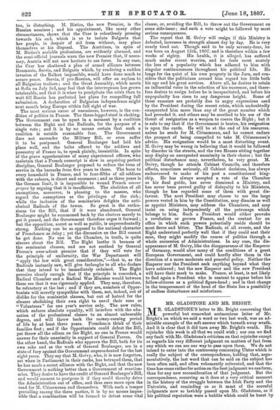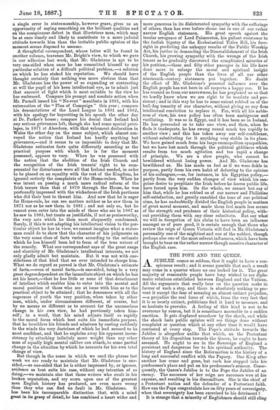MR. GLADSTONE AND MR. BRIGHT.
Art. GLADSTONE'S letter to Mr. Bright concerning that powerful but somewhat acrimonious letter of Mr. Bright's on which we said a word or two last week, was an ad- mirable example of the soft answer which turneth away wrath. And it is clear that it did turn away Mr. Bright's wrath. His rejoinder this week is all that we could wish ; nor can we find any fault with Mr. Gladstone's criticism on that rejoinder except as regards his very different judgment on matters of fact from any which we can see our way to pass upon them. We do not intend to enter into the controversy concerning Ulster which is really the subject of the correspondence, holding that, argu- mentatively, the last word that can be said on the subject has been often said, and often vehemently reiterated, and that the time has come rather for action on the best judgment we can form, than for any new reconsideration of that judgment. But the correspondence, occurring as it does at a very critical moment in the history of the struggle between the Irish Party and the Unionists, and reminding us as it must of the scornful judgments now so lavishly passed upon Mr. Gladstone, as if his political reputation were a bubble which could be burst by
a single error in statesmanship, however grave, gives us an opportunity of saying something on the brilliant qualities and on the conspicuous defect in that illustrious man, which may be at once timely and likely to contribute to a more judicial attitude towards him than the irritable public opinion of the moment seems disposed to assume. A thoughtful correspondent, whose letter will be found in another column, traverses Mr. Bright's view, to which we gave in our adhesion last week, that Mr. Gladstone is apt to be very one-sided when once he has committed himself to any particular solution of a difficult political problem,—a solution on which he has staked his reputation. We should have thought certainly that nothing was more obvious than that Mr. Gladstone has the power of so expanding or contracting at will the pupil of his keen intellectual eye, as to admit just that amount of light which is most suitable to the view he has embraced. Compare his prompt and resolute action when Mr. Parnell issued his " No-rent " manifesto in 1881, with his extenuation of the "Plan of Campaign' this year ; compare his denunciations of the Land League in 1881 and 1882, with his apology for boycotting in his speech the other day at Dr. Parker's house ; compare his denial that Ireland had any serious grievances left, though she had some special privi- leges, in 1871 at Aberdeen, with that vehement declaration in Wales the other day on the same subject, which almost con- veyed the notion that Ireland has hardly anything but grievances,—and it seems to us impossible to deny that Mr. Gladstone estimates facts quite differently according as the practical purpose with which he is for the moment possessed, appears to vary. When he was possessed with the notion that the abolition of the Irish Church and the recognition of the Irish tenants' right to be com- pensated for disturbance were all that Ireland needed, in order to be placed on an equality with the rest of the Kingdom, he ignored entirely the complaints of the Home-rulers. When he was intent on passing a much more radical reform of the Irish tenure than that of 1870 through the House, he was profoundly impressed with the wickedness of the Irish partisans who did their best to thwart him. And now that he is eager for Home-rule, he can see matters neither as he saw them in 1871 nor as he saw them in 1881 ; and not only so, but he cannot even enter into the minds of those who see in 1887 as he saw in 1881, but treats as justifiable, if not as praiseworthy, the very acts which he then most eloquently condemned. Surely, if this is not adapting his intellectual vision to the par- ticular object he has in view, we cannot imagine what a states- man could do to show that the character of his judgments on the very same class of facts varies according to the estimate which he has himself been led to form of the true nature of the remedy. What our correspondent says of the great range and elasticity of Mr. Gladstone's intellectual interests, we not only gladly admit but maintain. But it was not with one- sidednesa of that kind that we ever intended to charge him. What we do regard as proved is that Mr. Gladstone's estimate of facts,—even of moral facts,—is one-sided, being in a very great degree dependent on the immediate object on which he has set his heart,—that he has little or none of that detachment of intellect which enables him to enter into the mental and moral position of those who are at issue with him as to the practical object to be attained ; that he denounces with all the eagerness of youth the very position, when taken by other men, which, under circumstances different, of course, but by no means so different as to account for the unconscious change in his own view, he had previously taken him- self; in a word, that his mind adjusts itself so rapidly to the moral focus which best suits his immediate purpose, that he bewilders his friends and admirers by casting suddenly to the winds the very doctrines of which he had seemed to be most confident, and that he explains away his apparent incon- sistency by attaching infinitely more weight than any other man of equally high mental calibre can attach, to some partial change in the situation by which he accounts for his own total change of view.
But though in the sense in which we used the phrase last week we are ready to maintain that Mr. Gladstone is one- sided,—so one-sided that he is either impressed by, or ignores, evidence as beet snits his case, without any intention of so doing,—we maintain also that those writers who exult in his broken reputation, and cry scorn upon one of the greatest men English history has produced, are even more wrong than they who can find no fault in Mr. Gladstone. It has been his incomparable distinction that, with a mind great in its grasp of detail, he has combined a heart wider and
more generous in its disinterested sympathy with the sufferings of others, than has ever before shone out in one of our rather narrow English statesmen. His great speech against the insular arrogance of Lord Palmerston, his gallant resistance to the foolish bigotry of the Ecclesiastical Titles Bill, his fore- sight in predicting the unhappy results of the Public Worship Act, his justice in demanding the Disestablishment of the Irish Church, his growing sympathy with the wrongs of the Irish tenant as he gradually discovered the complicated miseries of his position,—these and fifty other passages in his life have done more to enlarge the moral and spiritual insight of the English people than the lives of all our other nineteenth-century statesmen put together. No doubt the effect of Mr. Gladstone's personal influence over the English people has not been in all respects a happy one. If he has weaned us from our narrowness, he has perplexed us so that we hardly know when we are right to be resolute and per- sistent; and in this way he has to some extent robbed us of the bull-dog tenacity of our character, without giving us any firm intellectual conviction to replace it. For, with all his noble- ness of view, his own policy has often been ambiguous and vacillating. It was so in Egypt, and it has been so in Ireland. He has persuaded us to take one view, and then, when he finds it inadequate, he has swung round much too rapidly to another view ; and this has taken away our self-confidence, without substituting for it anything very stable in its place. We have gained much from his large cosmopolitan sympathies, but we have lost much through the political giddiness which results from too much agitation and too rapid a change of principle. We are a slow people, who cannot be bewildered without losing power. And Mr. Gladstone has bewildered. us. He has made us feel as if we were fickle in purpose, partly from his own habit of deferring to the opinion of his colleagues,—as, for instance, in his Egyptian policy,— partly from the very sudden changes of view which his san- guine desire to propitiate the Irish before he leaves public life, have forced upon him. On the whole, we cannot but say of him that, while he has robbed us of our narrow and Philistine self-satisfaction, and greatly ennobled the tone of our political aims, he has undoubtedly divided the English people in matters of great moral moment, and made them feel much less secure of the strength and prudence of their historical policy, with- out providing them with any clear substitute. But say what we will in derogation of his claim to have been an influence amongst us of pure good, it is certain enough that those who review the reign of Queen Victoria will find in Mr. Gladstone's personality one of the mightiest and one of the noblest, though perhaps also one of the most solvent influences, which have been brought to bear on the rather narrow though massive character of the English race.



































 Previous page
Previous page